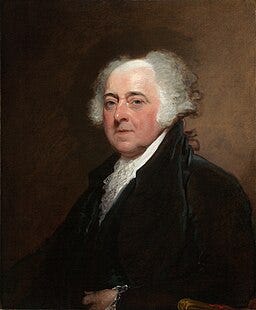John Adams on Donald Trump
What to do when voters covet oligarchy? The second president had some thoughts.
John Adams, painted by Gilbert Stuart (1800-1815), National Gallery of Art
There is a variety of sanctimony, especially prevalent in Washington, D.C., that says the American voters are never wrong. If the majority votes in a terrible candidate like James Buchanan in 1856 or Richard Nixon in 1972 or Donald Trump in 2024, well, that majority has legitimate reasons, and it’s the job of political reporters to figure these out as quickly as possible. Never mind that reliable information about whatever considerations, legitimate or not, motivated voters won’t be available until spring 2025, when a Census survey on this topic is released. If a political journalist doesn’t leap to explain the American People’s Higher Wisdom he will be condemned for being out of touch and elite.
This type of thinking can take journalism down some very strange alleyways. This past week CNN published a thumbsucker that gave serious consideration to whether the U.S. should expand its territory into Panama and Greenland, as suggested by Trump last week in an addled rant. We must consider this policy, CNN seemed to be saying, because jeez, I dunno, maybe the American people gave Trump some mandate to reinstate the American Imperium. Look, I understand, Trump’s going to be president, and he did win a (slim) popular-vote majority. But becoming president-elect didn’t make him stop being an ignorant, narcissistic, and increasingly senile blowhard. Trump is going to spout a lot of insane crap over the next four years. Let’s don’t take it seriously until we find reason to believe that he’ll follow through.
I take particular objection to the notion that the economy is in bad shape just because voters kept saying so in pre-election polls and in exit polls. They were wrong, OK? The economy is in good shape (though, as I wrote recently, expert forecasts for 2025 are unfavorable precisely because Trump got elected). That isn’t to deny the trend of growing income inequality dating to the late 1970s (about which I published a book a dozen years ago). But you'd be hard pressed to find anyone who isn’t better off today than they were four years ago. President Joe Biden did an uncommonly good job managing the economy, both in the cyclical sense (inflation came down without high interest rates prompting the usual recession) and in the sense that he reoriented Democratic policymaking away from Wall Street and more toward workers. I argued for Biden’s economic legacy in a podcast debate with McGill historian Gil Troy that was posted December 24 (just when everybody wants to think about politics, I know). You can listen to it here.
The notion that Trump won fair and square, with a popular-vote majority (so you can’t blame the Electoral College) and with a smaller war chest (so you can’t blame money poisoning politics) is not easy to accept. And while we really don’t know what voters had in mind, they can’t have been unaware, in pulling the lever for the star of The Apprentice, that they were casting a vote in favor of oligarchy. (If anything, voters probably think Trump is richer than he really is.) So what do we make of it when the electorate chooses oligarchy? As it happens, this was a scenario to which John Adams gave considerable thought. My year-end essay for The New Republic explores what he had to say, and what his ideological foe Thomas Jefferson had to say in reply. It was an interesting conversation, and this is, I think, one of the better pieces I’ve written lately. You can read it here.




Tim, this article is extraordinary, and extraordinarily excellent. I did not know any of this about Adams, and you have informed me. I knew something about Jefferson but not the parts in this piece. And you have put our recent and present situation into the thoughts and writings of two brilliant people who had a lot of experience of government. Thank you very much.
"Even the many Trump voters who pulled the lever for him in 2024 while disapproving of his personal behavior tend to envy the man."
I think that there is more to Trump's appeal. His followers do not merely envy the man, they ADORE him. He is the crystallized epitome of their belief system. In their belief silo he is the bond that pulls them together and creates a rave in which his true believers experience unaltered joy. No other will do. Ron DeSantis, JD, even Elon? No way. When Trump passes into the great beyond his cult will mourn. He will not be replaceable. Another messiah will eventually evolve, but this moment in time will never again be the same for Trump's cult. And it is difficult to pry cult members from their beliefs. Unpersuasive and ineffective are logical argument and rationale.